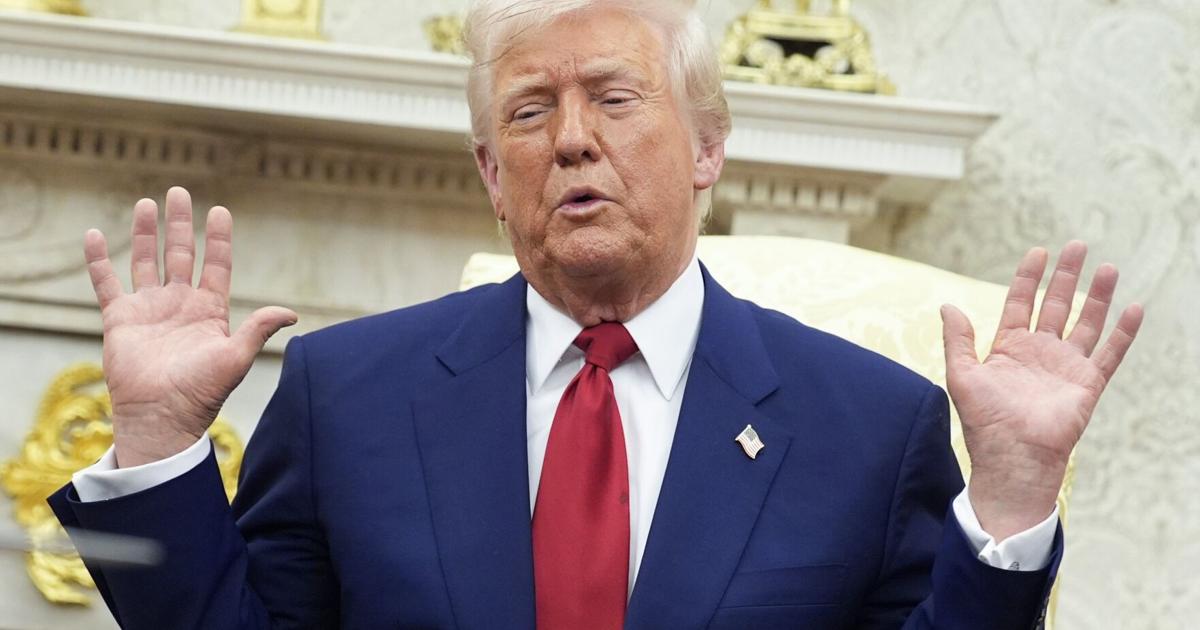U.S. President Donald Trump is not backing off threats to annex Canada, saying it wouldn’t take military force to make the country America’s 51st state.
Trump’s comments came in an interview with Kristen Welker on NBC News’ “Meet the Press” on Sunday where he said “I think we’re not going to ever get to that point” when asked if he would rule out military force to take Canada.
“I don’t see it with Canada,” Trump said. “I just don’t see it, I have to be honest with you.”
While Trump says military action against Canada is “highly unlikely,” he said “something could happen with Greenland.”
Trump also spoke about his recent call with Prime Minister Mark Carney after he was elected last Monday, describing the Canadian leader as “very nice” and congratulating him for his victory.
As Carney’s Liberal party secured a minority government, Trump commented on the prime minister’s narrow win.
“There’s no majority or anything, so that’s just going to make things a little bit difficult I think, for him to run,” he said. “But he nevertheless had a victory and he’s a very nice man.”
This comes days before Carney’s upcoming visit to the White House which will be the first in-person meeting for the two since Carney was sworn in as prime minister on March 14.
During this meeting, the leaders are set to discuss Trump’s trade war with Canada and the talks could lay the groundwork for negotiations of a new trade and security pact with the U.S.
In the interview, Trump said he will continue to talk about annexing Canada and will do so when meeting Carney, claiming the U.S. is “subsidizing Canada” despite not requiring “anything Canada has.”
“It would be a cherished state,” he told Welker.
He later said about Canada: “They think we’re subsidizing … they think we’re going to protect them and really we are, but the truth is they don’t carry their full share, and it’s unfair to the United States and our taxpayers.”
Amid Trump’s persistent jabs at Canada, experts say the process of Canada becoming a U.S. state is near impossible.
A fundamental issue that exists is that Canada is a constitutional monarchy while the U.S. is a republic.
“If you want to change from a monarchical to a republican system, you must deal with the office of the King,” said Gregory Tardi, formerly legal counsel to the House of Commons and Elections Canada. “And that brings you straight into section 41 of the Canada Act of 1982.”
This stipulates that, in order to amend the Constitution and dissolve the union, the Canadian Senate, House of Commons and every single provincial legislature must unanimously agree with the proposal.
“Frankly, I don’t see that happening,” he said, especially given how opposed most Canadians are to secession.
In a December interview with the Star, Adam Chapnick, a professor of defence studies at the Canadian Forces College said it would “take months, if not years, to negotiate, and it is not the priority of the United States government.”
Asked in the interview whether U.S. citizens and non-citizens both deserve due process as laid out in the Fifth Amendment of the Constitution, Trump was noncommittal.
“I don’t know. I’m not, I’m not a lawyer. I don’t know,” Trump said when pressed by Welker.
The Fifth Amendment provides “due process of law,” meaning a person has certain rights when it comes to being prosecuted for a crime. Also, the 14th Amendment says no state can “deny to any person within its jurisdiction the equal protection of the laws.”
Although previously suggesting he is looking into running for a third term, despite the constitutional two-term limit, Trump told Welker “this is not something I’m looking to do.”
“I’m looking to have four great years and turn it over to somebody, ideally a great Republican, a great Republican to carry it forward.”
With files from Kevin Jiang, Andy Takagi and The Associated Press



